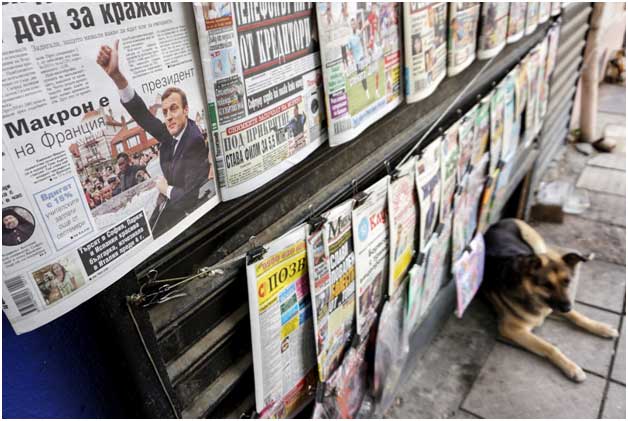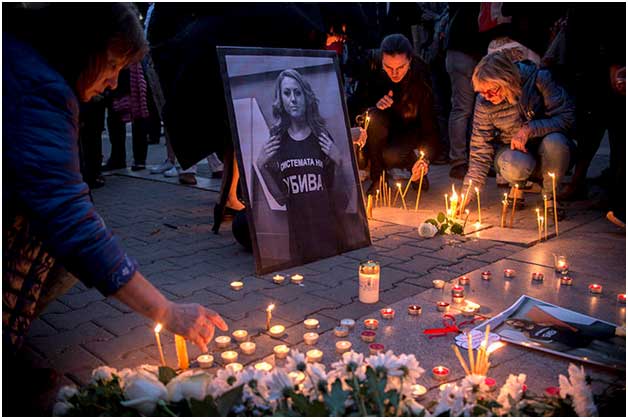by ATTILA MONG

In October 2018, Viktoria Marinova, a host for TVN, was raped and murdered near the station’s studios. When CPJ’s Europe correspondent, Attila Mong, spoke with her colleagues and other journalists during a trip to Bulgaria last month, they said that while they don’t believe the attack is linked to Marinova’s work, it has highlighted the dangers and pressures for investigative reporters.
Crammed in the small studio of TVN, a regional station in Ruse, north eastern Bulgaria, journalists share stories about their colleague, Viktoria Marinova. Barely six months ago, Marinova was raped and murdered not far from the station, while jogging on the banks of the Danube
Her colleagues still struggle to accept the loss, but they all agreed that Marinova, who presented mainly lifestyle shows, was not killed because of her journalism. “This is just a tragic coincidence,” said Ioanna Angelova, the chief editor of TVN.
Marinova’s closest colleagues and ex-husband, Svilen Maximov, who owns the TV station and an internet provider in the region, told me they thought that the investigation was professional, and agreed with the prosecutor’s assessment that it was not motivated by her work. However, some journalists said they think there were unanswered questions.
Their skepticism is perhaps understandable in an environment where investigative reporters are harassed, threatened, or subjected to smear campaigns, and where, according to EU polls, 70 percent of people do not trust law enforcement and the judicial system.
“You don’t need to kill or physically attack a journalist here in order to achieve your goals, there are broader, more systemic threats to press freedom,” said Boryana Dzhambazova, a freelance journalist and member of the Association of European Journalists–Bulgaria. Genka Shikerova, an investigative journalist for a national privately owned station, Nova TV, said, “The situation is getting so much worse, that whatever happened, we simply wanted to believe she was killed for her reporting.”
A few days before her death, Marianova hosted “Detektor,” which was intended to be a weekly flagship news program for TVN. The show aired just once–on September 30–broadcasting an interview with Bulgarian and Romanian investigative journalists who were briefly detained by the Bulgarian police while looking into allegations of fraud involving EU funds.
“Viktoria was the face of the show, but the interview was my idea and I recorded it,” her producer, Ivan Stefanov, said. “If somebody could have been killed, that is me.”

A vigil for TVN host Viktoria Marinova, in Sofia, in October 2018. Prosecutors ruled her murder was not related to her work, but the case highlighted the risks for Bulgaria’s investigative journalists. PHOTO/AFP/Nikolay Doychinov
I met one of the show’s guests–Bivol reporter Dimitar Stoyanov–in a secure location in downtown Sofia, rather than at the outlet’s offices. The location of Bivol‘s premises remains unknown to outsiders “for security reasons,” Stoyanov said.
He told me that in Bulgaria, the threat of physical violence is considerably greater for local journalists and reporters like their team members, who work outside the country’s big media companies.
The experiences of Georgi Ezekiev, the publisher of Zov News in Vratsa, backs up that view. His outlet published a joint investigation with Bivol in 2017 that implicated police officers in an alleged drug trafficking ring. Afterwards, he said, he and the chief editor Maria Dimitrova were threatened on social media and in text messages, and someone destroyed his car tires.
“One morning, I discovered that the entrance of my house was decorated as a funeral home with flowers, which was clearly a threat,” he said. On November 22, 2017, Bivol published video of man who was allegedly part of the ring, telling the reporters that his former mafia bosses were planning to eliminate Ezekiev. The publisher said that police denied the allegations made in their report.
“There is a real threat of physical violence for journalists who dig into possible links of between organized crime, law enforcement and politics,” Ezekiev said.
A June 2018 statement from Bulgaria to the Council of Europe’s platform to promote the protection of journalism and safety of journalists said that the Vratsa district prosecutor’s office rejected Ezekiev’s and Dimitrova’s complaints.
In Ezekiev’s case, the prosecutors ruled that the messages he received “could not in any way be classified as a threat,” and in Dimitrova’s case, “the collected data does not prove that there is threat of murder … the messages contain only obscene words and insults and not threats to her or her relative’s lives or health.”
Inter Press Service News for more